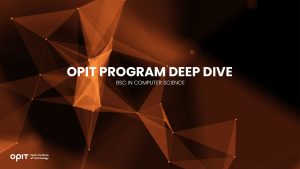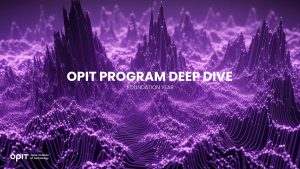

Source:
- IE University – Insights, Published on October 15th, 2024.
By Francesco Derchi
Purpose is a strategic tool for driving innovation, competitive advantage, and addressing AI challenges, writes Francesco Derchi.
Since the early 2000s, technology has dominated discussions among scholars and professionals about global development and economic trends, with the first wave of research regarding the internet’s impact on firms and society focusing on the enabling potential of technologies. The concept of “digital revolution,” as popularized by Nicholas Negroponte, became the new paradigm for broader considerations about the development of the firm’s macro environment, and how businesses could leverage it as an asset for creating competitive advantage. The following wave focused on the convergence of different technologies, such as manufacturing, and included the dynamics of coexistence between humans and machines. From the management side, the major challenges are related to defining effective digital transformation practices that could help to migrate organizations and exploit this new paradigm.
The current technological focus builds on these previous trends, particularly on artificial intelligence and more recently on the emergence of generative AI. The Age of AI is characterized by technology’s power to reshape business and society on a variety of levels. While AI’s pervasive impact is not new for firms, the mainstream adoption of ChatGPT for business purposes and the response to this ready adoption from big tech players like Microsoft, Google, and more recently Apple, shows how AI is reshaping and influencing companies’ strategic priorities.
From a research perspective, AI’s societal impact is inspiring new studies in the field of ethics. Luciano Floridi, now of Yale University, has identified several challenges for AI, characterizing them by global magnitudes like its environmental impact and has identified several challenges for AI security, including intellectual property, privacy, transparency, and accountability. In his work, Floridi underlines the importance of philosophy in defining problems and designing solutions – but it is equally important to consider how these challenges can be addressed at the firm level. What are the tools for managers?
Part of the answer may lie in the increasing and recent focus of management studies around “corporate purpose” and “brand purpose.” This trend represents an important attempt to deepen our understanding of “why to act” (purpose framing) and “how to act” (purpose formalizing and internalizing), while technology management studies address the “what to act” (purpose impacting) question. Furthermore, studies show that corporate purpose is critical for both digital native firms as well as traditional companies undergoing a digital transformation, serving as an important growth engine through purpose-driven innovation. It is therefore fair to ask: can purpose help in addressing any of the AI challenges previously mentioned?
Purpose concepts are not exclusively “cause-related” like CSR and environmental impact. Other types have emerged, such as “competence” (the function of the product) and “culture” (the intent that drives the business). This broadens the consideration of impact types that can help address specific challenges in the age of AI.
Purpose-driven organizations are not new. Take Tesla’s direction “to accelerate the world’s transition to sustainable energy” – it explicitly addresses environmental challenges while defining a business direction that requires constant innovation and leverages multiple converging technologies. The key is to have the purpose formalized and internalized within the company as a concrete drive for growth.
Due to its characteristics, the MTP plays a key role in digital transformation. This necessarily ambitious and long-term vision or goal – the Massive Transformative Purpose – requires firms, particularly those focused on exponential growth, to address emerging accelerating technologies with a purpose-first transformation logic. P&G’s Global Business Services division was able to improve market leadership and gain a competitive advantage over various start-ups and potential disruptors through its “Free up the employee, for free” MTP. This served as a north star for every employee, encouraging them to contribute ideas and best practices to overcome bulky processes and limitations.
My research on MTPs in AI-era firms explores their role in driving innovation to address specific challenges. Results show that the MTP impacts the organization across four dimensions, requiring commitment and synergy from management. Let’s consider these four dimensions by looking at Airbnb:
- Internal Impact: The MTP acts as the organization’s genetic code and guiding philosophy. It is key for leveraging employee motivation, with a strong relationship between purpose, organizational culture, and firm values. Airbnb’s culture of belonging highlights this, with its various purpose-shaping practices, starting with culture-fit interviews delivered during the recruitment process.
- Brand and Market Influence: The MTP contributes directly to building a strong brand and influencing the market. It allows firms to extend beyond functional and symbolic benefits to make the impact of the company on society visible. This involves addressing market demand coherently and consistently. Airbnb’s “Bélo” symbol visually represents this concept of belonging while their MTP features in campaigns like “Wall and Chain: A Story of Breaking Down Walls.”
- Competitive Advantage and Growth: The MTP drives innovation and can lead to superior stock market performance. In digital firms, it’s key in the creation of ecosystems that aggregate leveraged assets and third parties for value creation. The company’s “belong anywhere transformation journey” is a strategic initiative that formalized and interiorized the MTP through various touchpoints for all the different ecosystem members. As Leigh Gallagher details in her 2016 Fortune feature about the company, “When travellers leave their homes, they feel alone. They reach their Airbnb, and they feel accepted and taken care of by their host. They then feel safe to be the same kind of person they are when they’re at home.”
- Core Organization Identity: The MTP is considered part of the core dimension of the organization. More than a goal or business strategy, it is a strategic issue that generates a sense of direction and purpose that affects every part of the organization: internal, external, personality, and expression. This dimension also involves the role of the founder(s) and their personality in shaping the business. At Airbnb, the MTP is often used as a shortcut to explain the firm’s mission and vision. The founders’ approach is pragmatic, and instead of debating differences, time should be spent on execution. At the same time, the personalities of the three founders, Chesky, Gebbia, and Blecharcyzk, are the identity of the firm. They were the first hosts for the platform. Their credibility is key for making Airbnb a trustworthy and coherent proposal in a crowded market.
Executives and leaders of business in the current AI era should embrace three key principles. Be true: Purpose is an essential strategic tool that enables firms to identify and connect with their original selves, decoding their reason for being and embedding it into their identity. Be ambitious: The MTP allows for global impact, confronting major challenges by synthesizing business values and guiding innovation paths to address AI-related issues. Be generous: Purpose allows firms to explicitly address environmental and social issues, taking action on values-based challenges such as transparency, respect for intellectual property, and accountability. By following these principles, organizations and their leaders can maintain their direction and continue to advance in the AI era.
Read the full article below:
Related posts

Computer Science is fast becoming one of the most valuable fields of study, with high levels of demand and high-salaried career opportunities for successful graduates. If you’re looking for a flexible and rewarding way to hone your computing skills as part of a supportive global community, the BSc in Computer Science at the Open Institute of Technology (OPIT) could be the perfect next step.
Introducing the OPIT BSc in Computer Science
The OPIT BSc in Computer Science is a bachelor’s degree program that provides students with a comprehensive level of both theoretical and practical knowledge of all core areas of computer science. That includes the likes of programming, databases, cloud computing, software development, and artificial intelligence.
Like other programs at OPIT, the Computer Science BSc is delivered exclusively online, with a mixture of recorded and live content for students to engage with. Participants will enjoy the instruction of world-leading lecturers and professors from various fields, including software engineers at major tech brands and esteemed researchers, and will have many paths open to them upon graduation.
Graduates may, for example, seek to push on with their educational journeys, progressing on to a specialized master’s degree at OPIT, like the MSc in Digital Business and Innovation or the MSc in Responsible Artificial Intelligence. Or they could enter the working world in roles like software engineer, data scientist, web developer, app developer, or cybersecurity consultant.
The bullets below outline the key characteristics of this particular course:
- Duration: Three years in total, spread across six terms.
- Content: Core courses for the first four terms, a student-selected specialization for the fifth term, and a capstone project in the final term.
- Focus: Developing detailed theoretical knowledge and practical skills across all core areas of modern computer science.
- Format: Entirely online, with a mixture of live lessons and asynchronous content you can access 24/7 to learn at your own pace.
- Assessment: Progressive assessments over the course of the program, along with a capstone project and dissertation, but no final exams.
What You’ll Learn
Students enrolled in the BSc in Computer Science course at OPIT will enjoy comprehensive instruction in the increasingly diverse sectors that fall under the umbrella of computer science today. That includes a close look at emerging technologies, like AI and machine learning, as well as introductions to the fundamental skills involved in designing and developing pieces of software.
The first four terms are the same for all students. These will include introductions to software engineering, computer security, and cloud computing infrastructure, as well as courses focusing on the core skills that computer scientists invariably need in their careers, like project management, quality assurance, and technical English.
For the fifth term, students will have a choice. They can select five electives from a pool of 27, or select one field to specialize in from a group of five. You may choose to specialize in all things cybersecurity, for example, and learn about emerging cyber threats. Or you could focus more on specific elements of computer science that appeal to your interests and passions, such as game development.
Who It’s For
The BSc in Computer Science program can suit a whole range of prospective applicants and should appeal to anyone with an interest or passion for computing and a desire to pursue a professional career in this field. Whether you’re seeking to enter the world of software development, user experience design, data science, or another related sector, this is the course to consider.
In addition, thanks to OPIT’s engaging, flexible, and exclusively online teaching and learning systems, this course can appeal to people from all over the globe, of different ages, and from different walks of life. It’s equally suitable for recent high school graduates with dreams of making their own apps to seasoned professionals looking to broaden their knowledge or transition to a different career.
The Value of the BSc in Computer Science Course at OPIT
Plenty of universities and higher education establishments around the world offer degrees in computer science, but OPIT’s program stands out for several distinctive reasons.
Firstly, as previously touched upon, all OPIT courses are delivered online. Students have a schedule of live lessons to attend, but can also access recorded content and digital learning resources as and when they choose. This offers an unparalleled level of freedom and flexibility compared to more conventional educational institutions, putting students in the driving seat and letting them learn at their own pace.
OPIT also aims not merely to impart knowledge through lectures and teaching, but to actually help students gain the practical skills they need to take the next logical steps in their education or career. In other words, studying at OPIT isn’t simply about memorizing facts and paragraphs of text; it’s about learning how to apply the knowledge you gain in real-world settings.
OPIT students also enjoy the unique benefits of a global community of like-minded students and world-leading professors. Here, distance is no barrier, and while students and teachers may come from completely different corners of the globe, all are made to feel welcome and heard. Students can reach out to their lecturers when they feel the need for guidance, answers, and advice.
Other benefits of studying with OPIT include:
- Networking opportunities and events, like career fairs, where you can meet and speak with representatives from some of the world’s biggest tech brands
- Consistent support systems from start to finish of your educational journey in the form of mentorships and more
- Helpful tools to expedite your education, like the OPIT AI Copilot, which provides personalized study support
Entry Requirements and Fees
To enroll in the OPIT BSc in Computer Science and take your next steps towards a thrilling and fulfilling career in this field, you’ll need to meet some simple criteria. Unlike other educational institutions, which can impose strict and seemingly unattainable requirements on their applicants, OPIT aims to make tech education more accessible. As a result, aspiring students will require:
- A higher secondary school leaving certificate at EQF Level 4, or equivalent
- B2-level English proficiency, or higher
Naturally, applicants should also have a passion for computer science and a willingness to study, learn, and make the most of the resources, community, and support systems provided by the institute.
In addition, if you happen to have relevant work experience or educational achievements, you may be able to use these to skip certain modules or even entire terms and obtain your degree sooner. OPIT offers a comprehensive credit transfer program, which you can learn more about during the application process.
Regarding fees, OPIT also stands out from the crowd compared to conventional educational institutions, offering affordable rates to make higher tech education more accessible. There are early bird discounts, scholarship opportunities, and even the option to pay either on a term-by-term basis or a one-off up-front fee.

The Open Institute of Technology (OPIT) provides a curated collection of courses for students at every stage of their learning journey, including those who are just starting. For aspiring tech leaders and those who don’t quite feel ready to dive directly into a bachelor’s degree, there’s the OPIT Foundation Program. It’s the perfect starting point to gain core skills, boost confidence, and build a solid base for success.
Introducing the OPIT Foundation Year Program
As the name implies, OPIT’s Foundation Program is about foundation-level knowledge and skills. It’s the only pre-bachelor program in the OPIT lineup, and successful students on this 60-ECTS credit course will obtain a Pre-Tertiary Certificate in Information Technology upon its completion. From there, they can move on to higher levels of learning, like a Bachelor’s in Digital Business or Modern Computer Science.
In other words, the Foundation Program provides a gentle welcome into the world of higher technological education, while also serving as a springboard to help students achieve their long-term goals. By mixing both guided learning and independent study, it also prepares students for the EQF Level 4 experiences and challenges they’ll face once they enroll in a bachelor’s program in IT or a related field.
Here’s a quick breakdown of what the OPIT Foundation Program course involves:
- Duration: Six months, split into two terms, with each term lasting 13 weeks
- Content: Three courses per term, with each one worth 10 ECTS credits, for a total of 60
- Focus: Core skills, like mathematics, English, and introductory-level computing
- Format: Video lectures, independent learning, live sessions, and digital resources (e-books, etc.)
- Assessment: Two to three assessments over the course of the program
What You’ll Learn
The OPIT Foundation Program doesn’t intensely focus on any one particular topic, nor does it thrust onto you the more advanced, complicated aspects of technological education you would find in a bachelor’s or master’s program. Instead, it largely keeps things simple, focusing on the basic building blocks of knowledge and core skills so that students feel comfortable taking the next steps in their studies.
It includes the following courses, spread out across two terms:
- Academic Skills
- Mathematics Literacy I
- Mathematics Literacy II
- Internet and Digital Technology
- Academic Reading, Writing, and Communication
- Introduction to Computer Hardware and Software
Encompassing foundational-level lessons in digital business, computer science, and computer literacy, the Foundation Program produces graduates with a commanding knowledge of common operating systems. Exploring reading and writing, it also helps students master the art of communicating their ideas and responses in clear, academic English.
Who It’s For
The Foundation Year program is for people who are eager to enter the world of technology and eventually pursue a bachelor’s or higher level of education in this field, but feel they need more preparation. It’s for the people who want to work on their core skills and knowledge before progressing to more advanced topics, so that they don’t feel lost or left behind later on.
It can appeal to anyone with a high school-level education and ambitions of pushing themselves further, and to anyone who wants to work in fields like computer science, digital business, and artificial intelligence (AI). You don’t need extensive experience or qualifications to get started (more on that below); just a passion for tech and the motivation to learn.
The Value of the Foundation Program
With technology playing an increasingly integral role in the world today, millions of students want to develop their tech knowledge and skills. The problem is that technology-oriented degree courses can sometimes feel a little too complex or even inaccessible, especially for those who may not have had the most conventional educational journeys in the past.
While so many colleges and universities around the world simply expect students to show up with the relevant skills and knowledge to dive right into degree programs, OPIT understands that some students need a helping hand. That’s where the Foundation Program comes in – it’s the kind of course you won’t find at a typical university, aimed at bridging the gap between high school and higher education.
By progressing through the Foundation Program, students gain not just knowledge, but confidence. The entire course is aimed at eliminating uncertainty and unease. It imbues students with the skills and understanding they need to push onward, to believe in themselves, and to get more value from wherever their education takes them next.
On its own, this course won’t necessarily provide the qualifications you need to move straight into the job market, but it’s a vital stepping stone towards a degree. It also provides numerous other advantages that are unique to the OPIT community:
- Online Learning: Enjoy the benefits of being able to learn at your own pace, from the comfort of home, without the costs and inconveniences associated with relocation, commuting, and so on.
- Strong Support System: OPIT professors regularly check in with students and are on hand around the clock to answer queries and provide guidance.
- Academic Leaders: The OPIT faculty is made up of some of the world’s sharpest minds, including tech company heads, experienced researchers, and even former education ministers.
Entry Requirements and Fees
Unlike OPIT’s other, more advanced courses, the Foundation Program is aimed at beginners, so it does not have particularly strict or complex entry requirements. It’s designed to be as accessible as possible, so that almost anyone can acquire the skills they need to pursue education and a career in technology. The main thing you’ll need is a desire to learn and improve your skills, but applicants should also possess:
- English proficiency at level B2 or higher
- A Secondary School Leaving Certificate, or equivalent
Regarding the fees, OPIT strives to lower the financial barrier of education that can be such a deterrent in conventional education around the world. The institute’s tuition fees are fairly and competitively priced, all-inclusive (without any hidden charges to worry about), and accessible for those working with different budgets.
Given that all resources and instruction are provided online, you can also save a lot of money on relocation and living costs when you study with OPIT. In addition, applicants have the option to pay either up front, with a 10% discount on the total, or on a per-term basis, allowing you to stretch the cost out over a longer period to ease the financial burden.
Have questions?
Visit our FAQ page or get in touch with us!
Write us at +39 335 576 0263
Get in touch at hello@opit.com
Talk to one of our Study Advisors
We are international
We can speak in:


